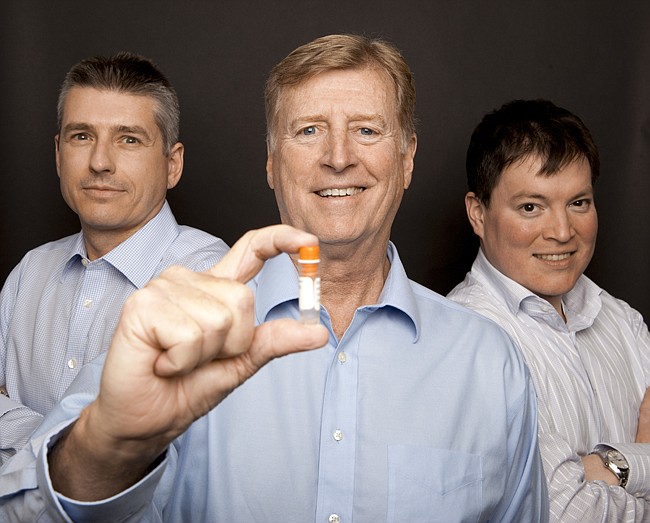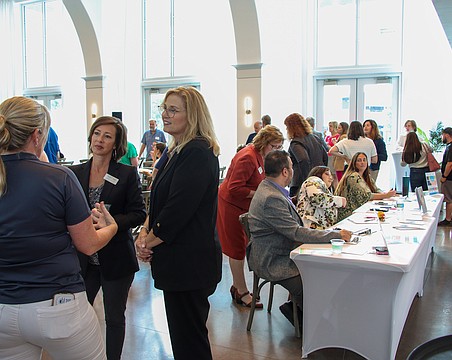REVIEW SUMMARY
Company. BioVest International Inc.
Industry. Biotechnology
Key. Focusing on processes in product development to guarantee FDA approval.
It takes a great deal of patience, some faith and bit of madness to hold equity in pharmaceutical companies. Things are especially risky for a small biotechnology company that went bankrupt before it could bring its product to the market.
It can take decades to go through the required testing to gain regulatory approval by the Food and Drug Administration, and BioVest International Inc., a Tampa biotechnology firm developing a vaccine for non-Hodgkin's lymphoma, entered Chapter 11 bankruptcy in 2008 in the midst of trials for its vaccine.
That's where the main challenge for the biotech industry lies: spending years undergoing five phases of clinical trials for the Food and Drug Administration with little or no revenue. The rigorous and time-consuming process can mean the death of any breakthrough idea.
BioVest, with its ostensibly groundbreaking product BiovaxID, has made it through Phase III trials and has plans to apply for FDA approval this year after successfully exiting its bankruptcy.
But the firm, which recorded a net loss of $15.3 million for its 2011 fiscal year, must keep capital coming in to avoid another bankruptcy during the approval process.
That's where Samuel Duffey stepped up to take command. Duffey was promoted from general counsel to president in 2008, after the company's reorganization. “We were like a turtle pulling our head, legs and tail into our shell,” Duffey says. “The bankruptcy was our shell.”
Duffey says he knew the company needed a new strategy, so he decided to focus on the development of the cancer vaccine, which he and his team see as the biggest opportunity for a future income stream.
Personalized treatment
Although BiovaxID is considered a cancer vaccine, it doesn't function the same way as other vaccines. For example, a flu vaccination helps its recipients build immunity to that particular strain of the flu, preventing sickness from it.
BioVest's vaccine is different in several ways. For one, the subject has already been diagnosed with non-Hodgkin's lymphoma, for which he or she may be under treatment. The disease could also be in remission.
Essentially, BiovaxID empowers the white blood cells of a patient's body to attack the mutated cells causing the cancer. The most recent test shows that the treatment is successful at locking non-Hodgkin's lymphoma in remission more than a year longer than patients receiving no treatment.
Another way BiovaxID differs from a usual vaccine is that it is customized for each patient. A sick individual would have a biopsy of his tumor shipped to BioVest, which then develops a product based on that sample. The personalized vaccine is created and returned to the subject.
Phase III testing, which Carlos Santos, BioVest vice president of product development and regulatory affairs, says is considered the “gold standard” for FDA trials, showed that BiovaxID was able to keep subjects of the test in remission for roughly 14 months longer than those given a placebo.
The FDA approval process consists of five phases of clinical trials that Douglas Calder, BioVest's vice president of strategic planning and capital markets, says take roughly 15 years to navigate. The third phase consists of a randomized study of individuals. If successful, the third phase is generally when the FDA will approve a drug. And following the approval, the final two phases are tests that take place after the drug is marketed.
Although the FDA has approved two other cancer vaccines, the process still proves difficult for BioVest. The FDA will weigh the benefits and risks of BiovaxID to determine its approval. But because cancer vaccines are so new, the government organization is still tweaking its approval conditions, Santos explains. Provenge, a vaccine targeting prostate cancer in men, was the first cancer vaccine to be approved in early 2010.
However, because BioVest's product extended the median remission time of its test subjects by more than a year, the benefit heavily outweighs the risk, Duffey says. “There was only a little bit of redness at the injection point,” says Santos on the minimal risk BiovaxID demonstrated in its Phase III trials.
Dr. Eduardo Sotomayor, the Susan and John Sykes Endowed Chair for Hermatologic Malgnancies at Moffitt Cancer Center in Tampa, says the timing is promising for BioVest's quest for approval. “Five years ago I would say the FDA would never approve a cancer vaccine,” Sotomayor says. “But the environment is more favorable, and there is a good chance (BiovaxID) will get FDA approval.”
Double down
The success demonstrated by BiovaxID Phase III trials, which was an eight-year study, gave investors hope during a dark time for the company. Accentia Biopharmaceuticals, a Tampa company that currently owns 61% of BioVest, filed for Chapter 11 bankruptcy in 2008. BioVest filed jointly.
In the midst of waiting for results from BioVest's Phase III trial, macroeconomic conditions froze credit markets in 2007 and hurled the firm into financial turmoil. As a small biotechnology company reliant mostly on financing to sustain operations, BioVest could not pay an outstanding debt to a secured creditor and entered reorganization.
But to the surprise of Charles Postler, the Tampa-based attorney representing BioVest in its bankruptcy proceedings, roughly 90% of the shareholders agreed to a reorganization plan. “There was the potential for major litigation there,” Postler explains. “But all the parties knew the company was developing potentially life-saving drugs.”
Secured and unsecured creditors agreed to double down on the company's future earnings potential and accepted stock as well as cash. “Most creditors took stock,” Postler says.
With the firm's financial crisis temporarily resolved, Duffey says the company replaced most of its scientific staff in 2008.
The company has $1.5 million cash on hand and may receive up to $6 million from Accentia's sale of Analytica International, an economic consulting subsidiary specializing in health care, Calder explains. He believes the company will have sufficient funding to make it through the FDA approval this year. Although he will not disclose specifics, Calder says the firm is working on a deal to restructure debt it has due in November and have the option of an equity offering to raise needed capital.
This year is a pivot point for the future of the company and its shareholders. If the company fails to get regulatory approval in any of the jurisdictions it applies (BioVest is seeking approval in Canada and the European Union as well), it may have to fund additional studies.
Calder says BioVest will seek out a large pharmaceutical firm to license BiovaxID to pay for such a study. Because the Phase III trials of the vaccine are complete, the product could go to the market, with post-market studies ordered by the FDA.
BioVest, which employs 38, is remodeling its corporate headquarters and plans to hire an undisclosed amount of new employees this year.
BioVest has a hurdle approaching, but the executive team is excited about the future of the company. “The Phoenix has risen from the ashes,” Duffey says. “Now the fun part begins.”
AT A GLANCE
BioVest International Inc.
Headquarters: Tampa
CEO: Samuel Duffey
2011 Revenues: $3.9 million
Stock symbol: BVTI
Recent stock price: $0.71
52-week stock-price range: $0.32 - $0.77
Price-earnings ratio (trailing 12 months): N/A
Dividend: N/A
Market capitalization: $99.8 million
Source: Bloomberg Businessweek






